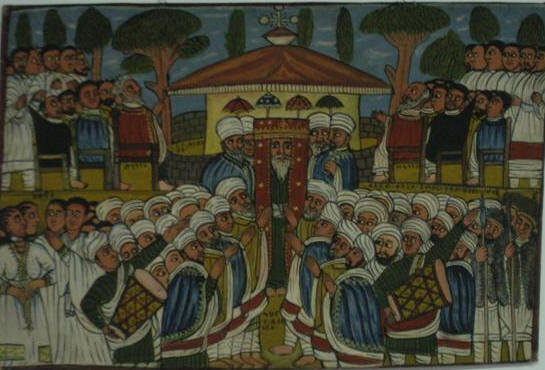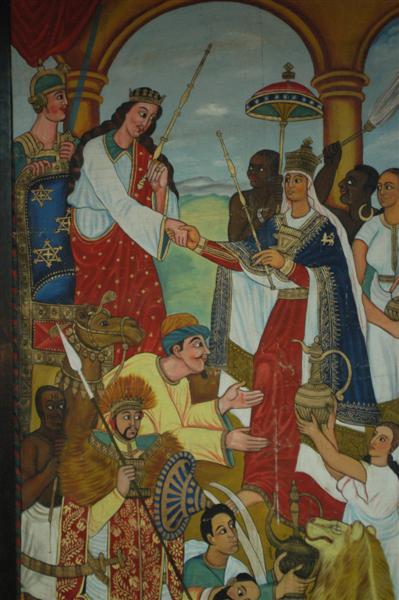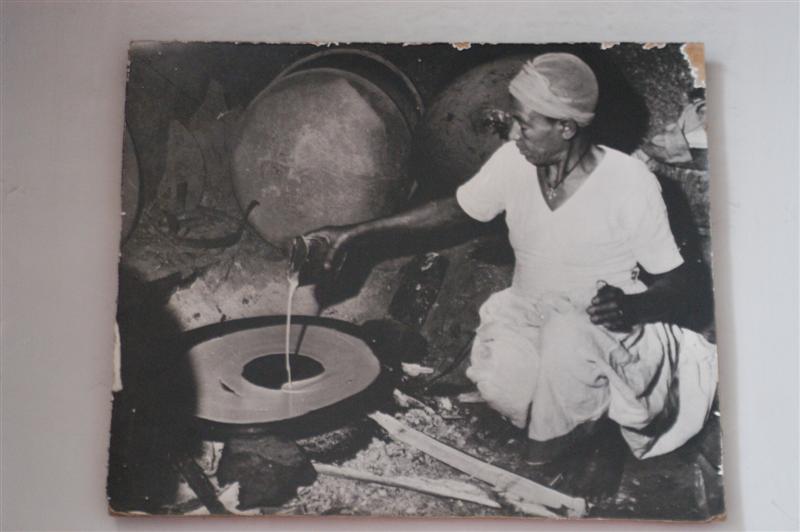October 27. ADDIS ABABA We woke up with the same deflated feeling from the day before. It wasn't as though the Meskel festival sounded like the biggest and best festival in the world but there was no escaping how stupid we felt for having missed it. At least the breakfast at our hotel, which was included, was pretty good. We tried to shake it off but we were now faced with the downside of having arrived during a holiday period, places were closed. Not only had we missed the festival we came to see but now there wasn't much we could do with our first day. But we decided to try and make the most of it. Addis was a sizable city and there had to be something that could keep us entertained on Meskel. We headed for the Hilton hotel in the center of the city to start the day. That is where the Ethiopian Air office was located and we wanted to confirm our flight to Bahar Dar and look into changing our flight to Dubai. having missed it. At least the breakfast at our hotel, which was included, was pretty good. We tried to shake it off but we were now faced with the downside of having arrived during a holiday period, places were closed. Not only had we missed the festival we came to see but now there wasn't much we could do with our first day. But we decided to try and make the most of it. Addis was a sizable city and there had to be something that could keep us entertained on Meskel. We headed for the Hilton hotel in the center of the city to start the day. That is where the Ethiopian Air office was located and we wanted to confirm our flight to Bahar Dar and look into changing our flight to Dubai.
The good thing about big hotels was that they were there to cater to tourists. While much of the city was closed the Hilton lobby was pretty lively. In addition to the Ethiopian Air office there were a number of souvenir shops. We wandered around, bought some postcards, and asked again about any further Meskel festivities but we were assured that it was all over. The woman who ran kiosk where we bought the postcards pulled one off of the rack to show us what we had missed. It showed a large bonfire surrounded by a group of Ethiopian Orthodox priests. This small center of attention was totally engulfed in a mob of people that stretched to the edge of the post card. We wouldn't have been able to get close enough to see anything anyway, we told our selves. The strange thing was that we drove right through Meskel square about five hours before this all happened and there was no sign of anybody getting ready for anything.
A model of a traditional Ethiopian home had been erected in the lobby of the Hilton, or rather the cross-section of a home. A woman dressed in traditional attire sat on the wooden floor and used her traditional kitchen to make Ethiopian coffee for people who sat on little stools around the edge of the home. The traditional ceremony involves actually roasting and grinding the beans in front of the guests. The ground were then put into a narrow-necked flask and hot water was added. The strong concoction was finally served in tiny cups with a heavy dose of sugar. We stopped and gave it a try. Ethiopia is where coffee originated and the finest coffee became known as Arabica because it was discovered and propagated by the Arabs.
After having our chat with Ethiopian Air and perusing the shops in the Hilton we walked out to the street to catch a cab over to the Sheraton. Since we were leaving a nice hotel they naturally wanted a ridiculous price so we just walked. It started to rain on us a bit but the Sheraton was only about ten minutes away. Where the Hilton was done in a sort of dated style, the Sheraton was a modern building, claiming to be Africa's first luxury resort, or having some such credential. It could have been anywhere in the world with its salmon colored exterior and flashy fou ntains. However, the plastic colored palm trees in the parking lot were rather Disneyland-esque. Like the Hilton, the hotel made us scan our belongs as we entered. The interior was much fancier than the Hilton but there wasn't that much in the way of souvenir shopping. Hotel souvenir shops were often a good way to determine quality of things we wanted to buy. The nice hotels tended to sell quality goods and provided a good basis of comparison for street shopping and bargaining. The Sheraton had some stylish restaurants, a busy cafe that was serving all-you-can-eat buffet deserts, and a nice pool area in the back where the famous fountains stood. Beyond the fountains we were able to look out over much of downtown Addis Ababa. The surroundings buildings and homes were old and decrepit, making the hotel seem like an anachronism that shouldn't have been there yet. ntains. However, the plastic colored palm trees in the parking lot were rather Disneyland-esque. Like the Hilton, the hotel made us scan our belongs as we entered. The interior was much fancier than the Hilton but there wasn't that much in the way of souvenir shopping. Hotel souvenir shops were often a good way to determine quality of things we wanted to buy. The nice hotels tended to sell quality goods and provided a good basis of comparison for street shopping and bargaining. The Sheraton had some stylish restaurants, a busy cafe that was serving all-you-can-eat buffet deserts, and a nice pool area in the back where the famous fountains stood. Beyond the fountains we were able to look out over much of downtown Addis Ababa. The surroundings buildings and homes were old and decrepit, making the hotel seem like an anachronism that shouldn't have been there yet.
After a leisurely look around the Sheraton we went walking into central Addis in search of some lunch. The rain had subsided and there was a trickle of people out on the streets but many were beggars. While others were home for Meskel the beggars were left with the empty streets of Addis. It wasn't surprising to see them but the fact that they were so many did become overwhelming and provided a shocking comparison to the luxury of the Sheraton Hotel. In the areas where there were shops we could have handed money to someone every twenty feet or less, and that is not an exaggeration. But, every once in a while we would have someone come up to us to just shake hands. Our initial reaction was that they were beggars and wanted money but a closer look revealed them to be well dressed people, not beggars. They were just being friendly and welcoming.
We searched for a place to eat lunch that we had found in our guidebook but it didn't appear to be there anymore, not just closed for the holiday but just not there at all. We walked towards Meskel Square and found another place, a European-style restaurant with okay food at fairly high prices. Our hotel restaurant was starting to look pretty good. When we finished we sat and waited for our change. It took a while before the waiter returned with the change and a dirty look. He had been pleasant during the entire meal so we could only link is sudden change in demeanor to the fact that we wanted our change. Leaving all of it would have been a rather generous and unwarranted tip. Rob had already set aside a more reasonable tip and we just wanted our change. The waiter had judged us swiftly and unreasonably. In retrospect we probably shouldn't have left a tip at all! Expectations of tipping in some countries can get really out of hand. Clearly this place got frequent tourists and had already had distorted expectations. and unwarranted tip. Rob had already set aside a more reasonable tip and we just wanted our change. The waiter had judged us swiftly and unreasonably. In retrospect we probably shouldn't have left a tip at all! Expectations of tipping in some countries can get really out of hand. Clearly this place got frequent tourists and had already had distorted expectations.
We continued our walk towards Meskel square and suddenly picked up a tail. The streets were too desolate no to notice so we made an abrupt stop and pretended to be talking over our plans. The guy had no choice but to keep going and gave himself away by repeatedly looking back at us. Once he was out of sight we kept going. Pickpockets were not uncommon on Addis.
Meskel square was completely empty and there weren't any signs of a bonfire from the night before. We passed by a local church and took a look inside the compound to see if anything was going on. The Meskel festival commemorated the finding of the true cross and the bonfire was topped with a cross and piles of Meskel daisies, meant to represent crosses. The bonfires were then blessed by a priest and lit. We still held on to some hope that this religiously significant event would have some spillover onto Monday but we just found a handful of people visiting the church and praying. This particular church was more of an outdoor altar because people couldn't go inside but approached the icons and kneeled to press their heads against the church. We stayed at a distance and watched.
It hadn't been much of a day but we had started to get a feel for Addis. For dinner we walked to a nearby Ethiopian restaurant called the Addis Ababa Restaurant. It was just a fifteen minute walk away, housed in a tukul shaped building. A tukul is the traditional cone-shaped, thatched-roof housing in Ethiopian. The restaurant was packed with people, all Ethiopians. We felt rather conspicuous when we walked inside. At the entrance there was a traditional Ethiopian coffee ceremony area set up with a row of small chairs lined up against the wall. The restaurant was laid out like a house and off of the main room there were a number of smaller rooms. We were directed to find our own seat and had to search nearly every room before finally finding a vacant seat. We were squeezed onto a small couch and our table was in the traditional Ethiopian style, sort of like an upturned basket with a table top woven onto it. The waiter was in a total frenzy, trying to cope with so many people. We gathered it was a particularly busy night because of Meskel. Eventually he came around and took our order. I knew a few dishes so we tried a spicy Doro Wat and another beef dish. Both were very good and the whole meal was much less than at our hotel. Injera bread, a kind of large crepe made from indigenous tef flour, was used to scoop up the saucy meat dishes. Unlike the Americanized version of injera I'd tasted in the US, this injera was slightly sour. Traditionally the dough is fermented to give it a sour flavor that will offset the spiciness. It took some getting used to but I started to like it. Overall the food was very good. During the entire meal we had occasional glances from people in the restaurant. We were the only tourists in the restaurant and we felt rather conspicuous. Walking back to the hotel we had our first experience of the "you, you" calling from a group of teenage boys. It was just a way to get our attention but the direct translation from Amharic didn't sound so good in English. We decided that a group of teenage boys out at night were often up to no good so we maintained our own conversation and went back to the hotel. |

